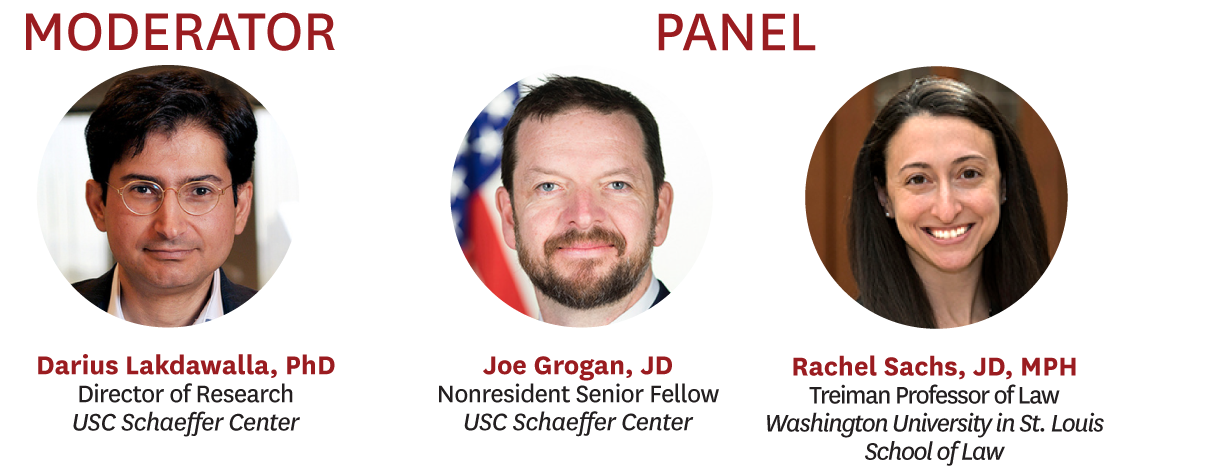In June 2021, the Food and Drug Administration (FDA) approved the first therapy to treat Alzheimer’s disease in nearly two decades. But the approval, once seen as a significant step for a disease that effects millions and has seen little progress in treatment or prevention, has been largely overshadowed by controversies around safety, effectiveness and cost. What tools can the FDA and Centers for Medicare and Medicaid Services (CMS) employ to incentivize innovation of breakthrough therapies for Alzheimer’s disease? What should be the standard for approval? And, how should approved therapies be reimbursed to reward innovation and ensure access?
On Monday, June 6, join the Schaeffer Center for a discussion about the regulatory challenges of approving and reimbursing therapies for Alzheimer’s disease. Schaeffer Center Director of Research Darius Lakdawalla will moderate a discussion between Rachel Sachs, Treiman Professor of Law at Washington University in St. Louis School of Law, and Joe Grogan, former Director of the Domestic Policy Council and Associate Director for Health Programs at the Office of Management and Budget.
- Event Date
- Monday, June 06, 2022
10:30 AM - 11:30 AM Pacific - Location

Darius Lakdawalla, PhD (Moderator), holds the Quintiles Chair in Pharmaceutical Development and Regulatory Innovation at USC, where he sits on the faculties of the USC Schaeffer Center, the USC School of Pharmacy and the USC Price School of Public Policy. He is a widely published, award-winning researcher, and a leading authority in both health economics and health policy.
He is currently a research associate at the National Bureau of Economic Research, associate editor for the American Journal of Health Economics and the Journal of Health Economics. He is also an editorial board member at the American Journal of Managed Care: Evidence-Based Diabetes and the American Journal of Managed Care: Evidence-Based Oncology.
Lakdawalla received his PhD in economics from the University of Chicago and his bachelor’s in mathematics and philosophy from Amherst College. His work has been published in leading journals of economics, medicine and health policy.
Joseph Grogan, JD, served as Assistant to President Donald J. Trump and Director of the Domestic Policy Council. He was the President’s lead advisor on a variety of domestic policy issues relating to healthcare, regulatory and deregulatory initiatives, economic expansion, commercial space exploration, environment, agriculture, civil rights, and education. He is a health policy thought leader who has played a key role in the health sector’s most consequential debates of the last decade.
Grogan was also a member of the White House’s COVID-19 Task Force, where he worked with Executive Branch officials to respond to the COVID-19 public health emergency.
During his time as Director of the Domestic Policy Council, Grogan led a White House team that directed the focus and attention of all major policy initiatives, including the development of regulations, Executive Orders, Presidential Decision Memorandums, and major Presidential announcements. In his role, Grogan coordinated with the President’s Cabinet, National Economic Council, White House Communications, Office of Management and Budget, and White House Legislative Affairs to drive the President’s domestic policy agenda. Notably, Grogan negotiated provisions of the 2020 Omnibus Spending Bill with Congressional leadership and members which eliminated a number of significant healthcare taxes. He developed a reputation as having an open door across the political spectrum for innovators and private industry seeking to solve complex problems in a highly regulated environment.
Rachel Sachs, JD, MPH, is the Treiman Professor of Law at Washington University in St. Louis School of Law. She is a nationally renowned scholar of innovation policy, exploring intellectual property law, food and drug regulation, and health law. Her scholarship has appeared in journals including The NYU Law Review, The Michigan Law Review, The Harvard Law Review, The New England Journal of Medicine, and The Journal of the American Medical Association. Prior to joining WashULaw, Sachs was an academic fellow at the Petrie-Flom Center for Health Law Policy, Biotechnology, and Bioethics, and a Lecturer in Law at Harvard Law School.
